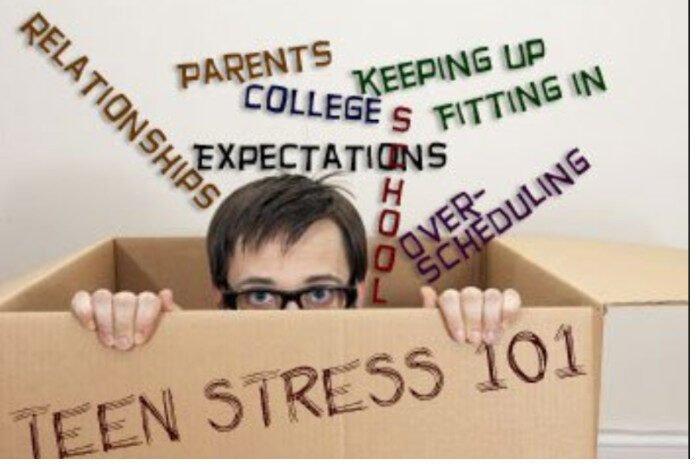Gone are the times when being a teenager was all about being care-free or care-less. Being a teen didn’t always mean posting to Instagram while binging the latest series on Netflix and riding around on some sort of Wi-Fi enabled skateboard. Back before the internet was even invented, that precious time between being a careless kid and over-stressed adult was different. Very different.
Imagine a life with no influencers or targeted ads on social media to tell people what to like. Imagine having to wait for the camera roll to be processed and not having any control/filters or luxury for repeat photo clicks. And if you did something embarrassing, it could all just be hearsay, and there’s little or no proof on Tiktok or Snapchat or the likes.
It’s very common for young people to feel stressed out from time to time. More so in the current day and age. According to data collected by the American Psychological Association for the Stress in America Survey, teen stress rivals that of adults. Yes, you read this right. The Teens are beating adults not only with their intelligence & brilliance but also with their STRESS. Results of the survey show that not only do teens identify that their stress levels are not healthy, but they also underestimate the impact stress has on their mental and physical health.

Here are some numbers that are glaring back at us:
- For teens, the most commonly reported sources of stress are school (83 %), getting into a good college or deciding what to do after high school (69 %)
- Many teens report lying awake at night (35 %), overeating or eating unhealthy foods (26 %), and skipping meals (23 %)
- 40 % of teens report feeling irritable or angry, 36 % report feeling nervous or anxious, 36 % report feeling fatigued or tired, and 31 % report feeling overwhelmed due to stress
Causes of New-age pandemic of teenage stress:
Why are teens stressed? Common things that teenagers say cause them stress include:
- homework and school (especially exams)
- expectations and pressure to do well at school from parents and family
- their social relationships with friends and boyfriends/girlfriends and the issue of sex
- life challenges, such as leaving school or getting into tertiary studies or employment
- lack of time – having too much to do, feeling unprepared or overwhelmed
- lack of sleep.
- bullying,
- body image issues/shaming.
Additionally, today’s youth also face additional two major challenges which I would like to focus in this blog:
High expectations and pressure to succeed: Between standardized testing and a culture of achievement, today’s youth can feel pressure to succeed in ways previous generations did not. According to survey done every year by Higher Education Research asking incoming college freshmen in USA if they feel overwhelmed by all they have to do:
In 2016, 41% of students said “yes” compared with
28% in 2000 and
18% in 1985.
Not being the best, not being able to excel or get into a super specialization or being average is equivalent to crime! The education system, the job opportunities and the competition – we can blame all of these all we want, but what is it we can do to make small but significant changes? Here are my two cents:
- One major step is exploring “Alternative Education” as parents & care givers. Although many people in India still assume ‘alternative’ to mean ‘special needs’, alternative education actually refers to pedagogical approaches that veer away from mainstream, traditional methods that are typically uniform, predefined, rigid, and designed to pass standardized tests.
2. How often do we tell our teens that it is OKAY to be Average, in fact it is a rarity to be just regular and not special. Everyone is in the rat race of being special, what we need to remind ourselves and our teens is that even if we win the rat race, we will remain a RAT.
3. Focus on building your teen’s Emotional Intelligence, Appreciating their eccentricities and teaching them what really matters – how to grow their own food for example?
Socialmedia:
Today’s children and teens are constantly connected to social media. It’s not surprising that their self-esteem―and worldview ―becomes connected to responses to social media posts. It’s hard for them not to compare their life and social connections to what they see others posting on social media. The pressures of being included, following a trend and virtual world all piles up. Unfortunately, a 100 friends on Facebook doesn’t guarantee a meaningful connection. In the USA for example loneliness affects one-fifth of the population. In the UK, it is experienced by more than a third of those over the age of 50.
Looking at social media content such as a friend’s beach vacation, graduation school acceptance letter, or happy family might make individuals feel bad about themselves. Taking in the photos or posts of people with seemingly “perfect” lives can make social media users feel like they just don’t measure up. A 2015 University of Missouri study found that regular Facebook users were more likely to develop depression if they felt feelings of envy on the networking site.
Social media can also give users a case of FOMO, for example, if they were invited on their friend’s beach vacation but couldn’t go for some reason. Or if the friend didn’t ask them on the trip at all, users might feel hurt and left out to see that others in their social circle were. It can lead them to question their friendships or their own self-worth.
Social media users who visit an ex’s social media page and see pictures of their former partner wining and dining a new love interest can also experience FOMO. They might wonder why their ex never took them to such fancy restaurants or lavished them with gifts.
Prior to social media and the internet, children only had to worry about bullying on school grounds, for the most part. But social media has given bullies a new way to torment their victims. With just one click, bullies can circulate a video of their target being ridiculed, beaten up, or otherwise humiliated. Groups of mean girls and boys can swarm a peer’s social media page, leaving negative comments or spreading misinformation.
Some teens become overloaded with stress. When this happens, it can lead to anxiety, withdrawal, aggression, physical illness, or poor coping skills such as drug and/or alcohol use.
Some recommendations to reduce the negative impact of Social Media:
- I personally recommend watching the documentary Social Dilemma on Netflix with your Teen. https://www.netflix.com/title/81254224
- Simple steps like just switching off the NOTIFICATIONS on your phone can go a long way
Dr. Prajakta and I use Homeopathy, Zen Counselling & Various Emotional Release processes that can help in managing the pressures of being a teenager in today’s time. Several teens come to us with several psychological issues or physical complaints which have a psychological root cause. Some children respond beautifully with homeopathy while others require a more intricate inner work with counselling, emotional release and meditations.
Depression, Lack of Self Confidence, Stammering, Body-Image Phobia, Anger Management, Anxiety, OCD are just a few things our teens are struggling with and we need to acknowledge and address them as quickly as possible along with improving the environment in which they can flourish.
To know more about us or book an appointment www.healingharmony.in
About the Authors:
Dr. Preety Shah is a homeopath, a fellow in homeopathic psychiatry and counselling and a mentor to many budding homeopaths. She is gifted with the natural art of understanding human psyche and healing. A seeker in spirit, Dr. Preety has been meditating since she was a child. She has meditated and studied different meditation techniques in various ashrams and meditation centers across India including Vipassana, OSHO, Mooji, Ramana Maharshi etc. She is a certified meditation facilitator from OSHO Multiversity.
She is a poet, story-teller and loves natural living. She aspires to live on a farm someday.

